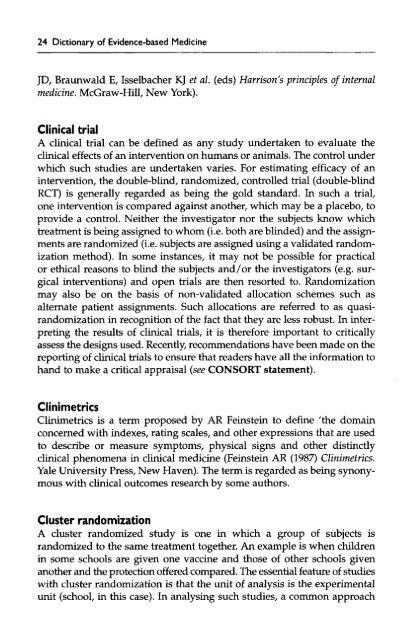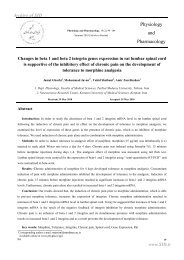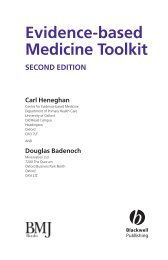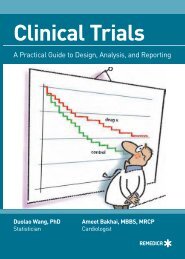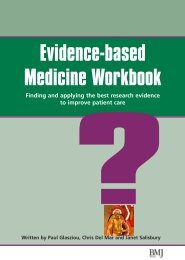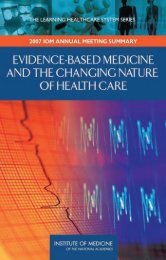Dictionary of Evidence-based Medicine.pdf
Dictionary of Evidence-based Medicine.pdf
Dictionary of Evidence-based Medicine.pdf
Create successful ePaper yourself
Turn your PDF publications into a flip-book with our unique Google optimized e-Paper software.
24 <strong>Dictionary</strong> <strong>of</strong> <strong>Evidence</strong>-<strong>based</strong> <strong>Medicine</strong><br />
JD, Braunwald E, Isselbacher KJ et al. (eds) Harrison's principles <strong>of</strong> internal<br />
medicine. McGraw-Hill, New York).<br />
Clinical trial<br />
A clinical trial can be defined as any study undertaken to evaluate the<br />
clinical effects <strong>of</strong> an intervention on humans or animals. The control under<br />
which such studies are undertaken varies. For estimating efficacy <strong>of</strong> an<br />
intervention, the double-blind, randomized, controlled trial (double-blind<br />
RCT) is generally regarded as being the gold standard. In such a trial,<br />
one intervention is compared against another, which may be a placebo, to<br />
provide a control. Neither the investigator nor the subjects know which<br />
treatment is being assigned to whom (i.e. both are blinded) and the assignments<br />
are randomized (i.e. subjects are assigned using a validated randomization<br />
method). In some instances, it may not be possible for practical<br />
or ethical reasons to blind the subjects and/or the investigators (e.g. surgical<br />
interventions) and open trials are then resorted to. Randomization<br />
may also be on the basis <strong>of</strong> non-validated allocation schemes such as<br />
alternate patient assignments. Such allocations are referred to as quasirandomization<br />
in recognition <strong>of</strong> the fact that they are less robust. In interpreting<br />
the results <strong>of</strong> clinical trials, it is therefore important to critically<br />
assess the designs used. Recently, recommendations have been made on the<br />
reporting <strong>of</strong> clinical trials to ensure that readers have all the information to<br />
hand to make a critical appraisal (see CONSORT statement).<br />
Clinimetrics<br />
Clinimetrics is a term proposed by AR Feinstein to define 'the domain<br />
concerned with indexes, rating scales, and other expressions that are used<br />
to describe or measure symptoms, physical signs and other distinctly<br />
clinical phenomena in clinical medicine (Feinstein AR (1987) Clinimetrics.<br />
Yale University Press, New Haven). The term is regarded as being synonymous<br />
with clinical outcomes research by some authors.<br />
Cluster randomization<br />
A cluster randomized study is one in which a group <strong>of</strong> subjects is<br />
randomized to the same treatment together. An example is when children<br />
in some schools are given one vaccine and those <strong>of</strong> other schools given<br />
another and the protection <strong>of</strong>fered compared. The essential feature <strong>of</strong> studies<br />
with cluster randomization is that the unit <strong>of</strong> analysis is the experimental<br />
unit (school, in this case). In analysing such studies, a common approach


